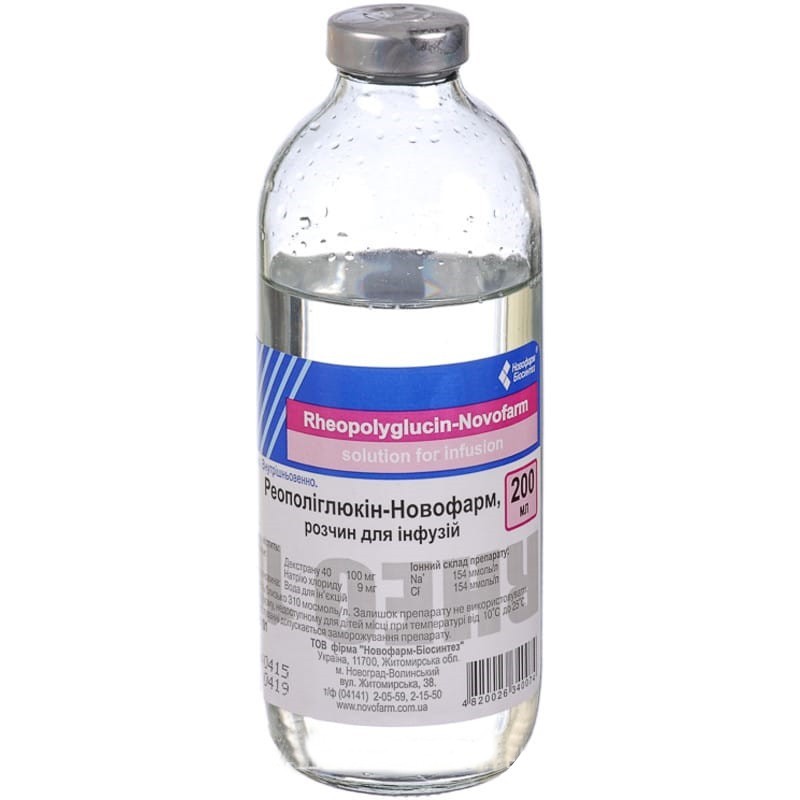



 Secure and encrypted payment processing
Secure and encrypted payment processing We ship to over 40 countries including the USA, UK, Europe, Australia and Japan
We ship to over 40 countries including the USA, UK, Europe, Australia and Japan Guaranteed refund or reship if you haven't received your order
Guaranteed refund or reship if you haven't received your orderRheopolyglucin-Novofarm infusion solution is used for the following indications:
1 ml of solution contains (active substances):
Excipient - water for injection.
Assign intravenously drip. Before administration, the solution is heated to 35-37 ° C. Doses and rate of administration are determined individually.
In case of violation of capillary blood flow (various forms of shock), the maximum daily dose for adults is 20 ml / kg, for children - 5-10 ml / kg (if necessary, up to 15 ml / kg).
When operations with cardiopulmonary bypass are added to the blood at the rate of 10-20 ml / kg to fill the pump of the oxygen generator; the concentration of dextran in the perfusion solution should not exceed 3%. In the postoperative period, the drug should be used in the same doses as for violation of capillary blood flow.
The drug should be administered without mixing with other drugs. With vital indications, the drug can be administered quickly, even in a jet at the rate of 15 ml / kg.
In patients with hemorrhagic stroke, head injuries, the drug should be administered at a rate of 10-15 ml / kg and not more.
The drug can be used during pregnancy and lactation according to indications and taking into account the risk / benefit ratio.
The drug can be used in children; dose should be determined taking into account body weight.
The ability of the drug to influence the reaction rate when driving vehicles or other mechanisms has not been investigated. But you should consider the likelihood of such side effects as general weakness and dizziness.
The occurrence of hypervolemia, hypocoagulation.
Treatment. Therapy is symptomatic.
Allergic reactions: anaphylactic shock, angioedema, rash, itching, sensation of fever, fever, increased sweating, hypersensitivity reactions.
From the cardiovascular system: fluctuations in blood pressure, tachycardia, dyspnea, edema.
From the digestive tract: nausea, vomiting, dry mouth, abdominal pain.
From the nervous system: headache, dizziness, tremor.
From the urinary system: as a rule, especially with hypovolemia, the drug causes an increase in diuresis. However, sometimes with the use of the drug Rheopolyglucin-Novofarm a decrease in diuresis is observed, the urine becomes viscous, which indicates the dehydration of the patients body. In this case, it is necessary to introduce intravenous crystalloid solutions to restore and maintain the osmoticity of blood plasma.
When using the drug at a rate of more than 15 ml / kg, hyperosmolarity occurs, which can cause a tubular burn with the subsequent development of acute renal failure. Accordingly, there is a decrease in urine output, urine becomes viscous.
On the part of the blood: acrocyanosis, hyperemia, decreased platelet function. The drug makes it difficult to determine the blood group.
Others: general weakness, swelling of the extremities, lower back pain, pain behind the sternum, feeling of lack of air, cramps.
In case of adverse reactions (depending on the clinical situation), you should immediately stop administering the drug and, without removing the needle from the vein, start all urgent measures prescribed by the relevant instructions to eliminate the transfusion reaction (the introduction of cardiovascular drugs, corticosteroids, antihistamines, crystalloid solutions, with collapse - vasopressors and cardiotonics).
Given the possible physico-chemical incompatibility, you cannot add any other drugs to the solution "Rheopolyglucin-Novofarm."
Store in a dry place inaccessible to children at a temperature of 10 ° C to 25 ° C. During transportation, freezing of the drug is allowed.
Shelf life is 4 years.